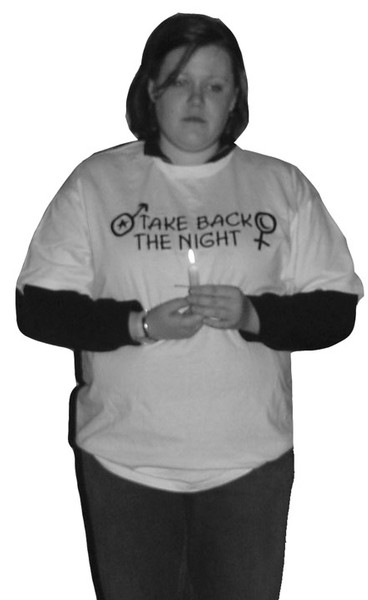Take Back the Night rally

April 8, 2004
Drumbeats every 15 seconds punctuated last week’s Take Back theNight rally at Simpson, symbolizing the average passage of timebetween beatings of American women – usually by intimatepartners.
Students and faculty from across the college attended the rallythat was sponsored by Sophia, the Simpson women’s group, and servedas the conclusion of the Women’s History Month observance at thecollege.
“We wanted to have this rally to show to the campus that thereare domestic violence survivors on campus and to raise awareness ofthe problem,” said junior Deanne Bales, who is co-president ofSophia.
Bales said Take Back the Night rallies generally “supportsurvivors and victims of domestic violence of any type such aspsychological abuse, physical abuse and rapes.”
Sophia, who organized the event, used the rally as an awarenesstool. They wanted to let people know how to avoid violentrelationships and if someone is in that kind of relationship to letthem know they can get help.
“Take Back the Night is an international rally and march that isorganized in local communities with the purpose of unifying women,men, and children in an awareness of violence against women,children and families,” said Lora Friedrich, associate professor ofsociology and director of Simpson’s women’s studies program.
Take Back the Night rallies and marches began in England tofight the fear that women encountered walking the streets at night,Friedrich said. The first United States rally occurred in SanFrancisco in 1978.
A 2000 U.N. study is the source of the claim that an Americanwoman is battered every 15 seconds. And most violent crimes againstU.S. women go unreported, according to the National CrimeVictimization Survey.
The NCVS study showed that, in 2001, only 39 percent of rapesand sexual assaults were reported to law enforcement officials.
Victims of violence who shared their stories at Simpson had thechance to educate others.
“Most people who attended do not know how people they interactwith everyday are affected by domestic violence,” said Bales. “Mostsurvivors do not tell people much about their experience, buthaving a rally in a supportive environment helps them come openabout what happened.”
This was the second year in a row at Simpson for a Take Back theNight rally, which began with the history of the movement andstatistics on domestic violence. Victims of domestic violenceshared their personal experiences, and poems about domesticviolence and rape were read aloud.











